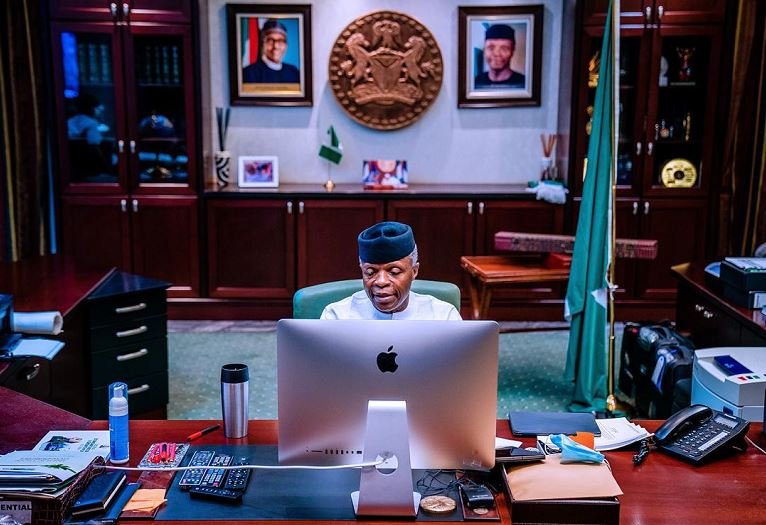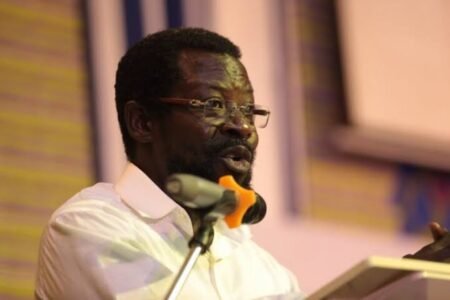Vice President Yemi Osinbajo is optimistic that Nigeria and Nigerians will come out stronger when the coronavirus pandemic is behind us because “we are a resilient and innovative people”.
Prof. Osinbajo made the confident statement was he was interviewed on The Platform by Pastor Poju Oyemade, the convener and moderator on Saturday, 2 May 2020.
The Vice President who was the last guest to speak on the theme, “Nigeria’s battle against COVID-19: The Journey So Far” said the Buhari administration was putting things in place to ensure that jobs are protected and new ones are created.
Osinbajo who chairs the Economic Sustainability Committee (ESC) set up by President Muhammadu Buhari explained that the coronavirus pandemic provided an avenue for government to look inwards, cut personal cost and invest in human capital development.
“One of the Silver linings of the pandemic cloud is that it has shown the need to have a comprehensive data of the population. We were able to do a great job earlier with the TraderMoni, MarketMoni and some of the other schemes.
“We enumerated four million persons using traditional methods in record time. This means that with dedication to the process we can capture the entire country. The Minister for Humanitarian and Disaster Management has been doing a lot in this regard and we have the local capacity to get this done.
“We expected at the start of the year for oil to be at $60 per barrel but we now find ourselves at value falling below $20 and that means we are finding it hard to attend to infrastructural projects that were earmarked as well as support for the states but this provides us with opportunities to further diversify the economy.”
He said the ESC was set up to address some of the fears of the citizens and to ensure sustainability and growth of the economy.
“The President set up the Economic Sustainability Committee which was meant to look at how the nation can respond by rapidly creating an enabling environment from which the nation will spring back as soon as we get a hand on the coronavirus.
“There are two main targets of the economic sustainability committee and the first was focusing on local resources.
“Such items as road construction used to be done from imported bitumen but now that we have discovered the process by which we can build roads with the use of cement and the nation is a major exporter of limestone we can use that as a raw material instead.
He said the government was also looking to create jobs and value in the agriculture sector. “Agriculture is the other process that we are looking at and I’m talking about the entire value chain.
“This means that we will be able to provide employment for more of our citizens and the models are being designed with the Central Bank of Nigeria, ministry for agriculture and the various States as well as the private sector.
“The state provides the land, Federal Government provides seedlings and fertilizers and then we can bring in hundreds of thousands of people in Small holder capacity.
“This has already proven successful as we have such farms in Benue and Nasarawa and some other states that already doing well. We have realised that this is the way to go because the government can no longer continue to sustain the expenditure of huge amount of Dollars for locally manufacturable good.
“We have noticed a drop in the amount of money being spent and agricultural importation which used to stand at 16 billion dollars in 2016, 10 billion in 2018 and it is even dropped further and shall continue to do so.
“All these gaps shall be taken up by Nigerians as sources for income. I would also like to mention that the MSME’s improved a lot during the last years and the COVID-19 era is an opportunity for more to spring up as we seek to change the narrative if we have the support of all the sectors and the populace in general.
Other contributors to discussions at the virtual summit include the Governors Kayode Fayemi of Ekiti State; Babajide Sanwo-Olu of Lagos State, Nasir El-rufai of Kaduna State; Ifeanyi Okowa of Delta State, Abdullahi Sule of Nasarawa State and Godwin Obaseki of Edo State. The Director-General of the Nigeria Center for Disease Control, Dr. Chike Ihekweazu also spoke at the interaction which included interviews, panel discussion and speeches.











